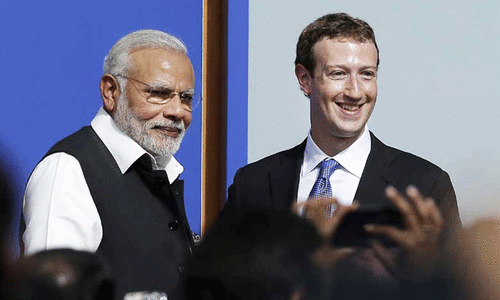Just 10 days ago, The Wall Street Journal published a story on how Facebook cosied up to the overlords in the Indian government. It didn’t take down posts by a BJP MLA that were in violation of the company’s policies because it wasn’t good for business.
Such controversies have become a matter of routine ever since that Cambridge Analytica scandal. And the social networking website isn’t the only one: other big boys in the tech industry are regular visitors to the regulators, some for shaky tax compliance while others for allegedly using third-party data to stifle competition.
Read | Facebook refused to check hate speech by India's BJP fearing business fallout: WSJ report
So much so that Big Tech is now taking on individual states — or a union of many — for control and influencing the way governments operate by favouring certain parties or countries over others. Yet if you listen to tech entrepreneurs, they won’t shut up about how their product/idea will democratise knowledge or empower consumers and other such lofty claims.
Generally, leading the pack are crypto enthusiasts who believe currencies should be freed from the shackles of central banks (so they can fluctuate every microsecond). Others, perhaps not as radical, give hints of similar opinions by casually mentioning their plans of amassing user data and monetising that in a rather control-obsessed manner without showing any understanding of or concern about its privacy and security.
Given the tech sector’s ability to scale and evolve rapidly, the potential for abuse is huge
Examples are given of how platforms like YouTube, TikTok or Facebook have given voice to the ordinary man, though nothing is mentioned about the inherent bias in algorithms or sometimes just straight-up preferential treatment. A good case in point is Twitter’s announcement on Aug 6 that it will be labelling posts from state-affiliated media organisations as such, but adding those “with editorial independence, like the BBC in the United Kingdom or NPR in the United States for example, will not be labelled.”
No doubt these two have produced some great work. But by virtue of being associated with governments, both of them have been used as propaganda tools — even if the frequency is maybe less than that of Russia Today or TRT World.
From facial recognition algorithms that help governments target dissenters to private credit rating agencies that can classify someone as “defaulter” over petty loan amounts (and in some cases even publicly shame them), technology is now at the heart of all that’s wrong. Some would argue that tech is not to be blamed for any of this. After all, it’s just a means that can be used for whatever ends that in turn ultimately depend on the user.
However, that sounds awfully similar to the defence put up by the gun lobby in the United States after every public shooting incident: “Guns don’t kill people, people do.” It suggests that technology is value-neutral, meaning it is neither good nor bad in itself. But that view is strongly contested by the other school of thought that believes tech develops its own ethics.
“Nuclear warheads are a very good example of this phenomenon where in case of an attack, the protocol is that you have to strike back. All the religious commandments that you can’t hurt old people, women, children etc become irrelevant,” says Omar Bin Ahsan, an entrepreneur who also teaches philosophy.
For the technology-driven new economy, ethics are largely about control, which comes from amassing the most (quality) data. Given how much Pakistan lags in the technology sector, one would expect our local entrepreneurs to have relatively benign views regarding control. But unfortunately, that is not the case at least in terms of aspirations. No wonder it’s quite common to come across local apps that ask for permission to access too much personal data, going well beyond what they require and, thus, violating the principles of privacy.
In fact, in companies that are most vocal about decentralising decision-making and making every worker the brand ambassador, there is a very clear pattern of even the directorial level employees hesitating to comment anything other than the usual carefully constructed statements. Of course, this is not exclusive to technology. The financial world (especially banks) or other businesses are equally guilty of it. But the latter has always been known for its hierarchies and structures while the former has branded itself in a more hipster way.
While we’re at it, let’s also discuss the general trend of tech (or tech-savvy) companies undertaking surveillance. “It was everywhere. It was inside your phone, in the guise of protecting company data. It was embedded into your laptops, tracking keystrokes and keeping an eye on everything you do, even when you were at home. Colleagues have had IT flag their systems for viewing ‘questionable content’ on their personal devices while they were home,” said Natasha Uderani, who’s worked with a few major startups in the country.
Perhaps the issue is not really about one particular sector, and is more of a problem that plagues the business world as a whole. But given tech’s ability to scale and evolve rapidly, the potential for abuse is far greater.
Published in Dawn, The Business and Finance Weekly, August 24th, 2020















































Dear visitor, the comments section is undergoing an overhaul and will return soon.